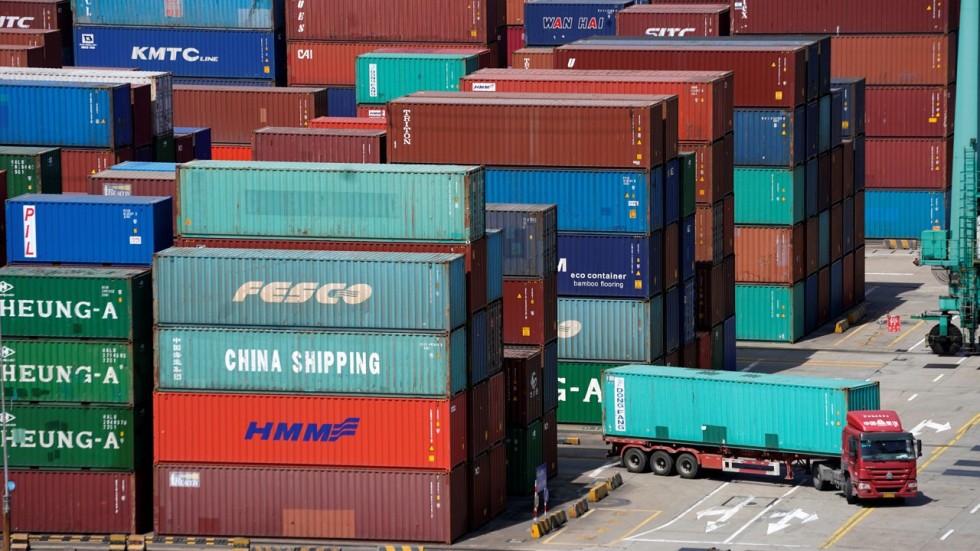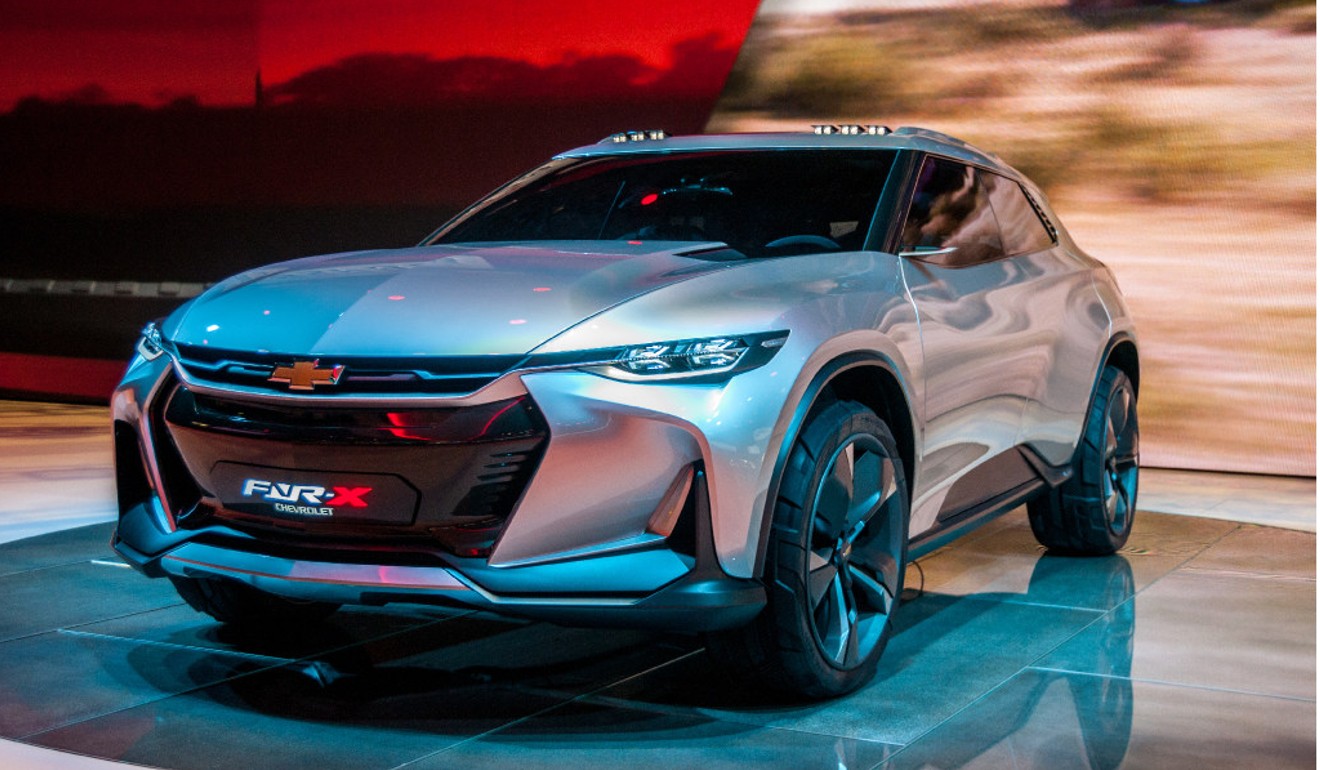US, China deliver on threats as ‘biggest trade war in economic history’ starts at high noon
Analysts say conflict could damage the global economy, but Chinese social media users are more interested in a ship full of soybeans

Orange WangAmanda Lee
The “biggest trade war in economic history” began on Friday, China said after Washington and Beijing traded 25 per cent tariffs on US$34 billion worth of each other’s goods, while analysts warned the dispute was set to run and run.
Wei Jianguo, a former deputy Chinese commerce minister, said the conflict would affect the global value chain and people should not expect a swift resolution.
“The trade war will last for a long time,” he said.
Now vice-chairman of the government-backed China Centre for International Economic Exchanges, Wei said that China was “prepared to fight … to defeat the [unilateralism] of the US”.
At 12 noon Beijing time, Washington made good on its promise to impose fresh tariffs on goods it imports from China.
China hits retaliation button, launching tariffs as trade war with US starts
US President Donald Trump told reporters aboard Air Force One that similar duties could be applied to a further US$16 billion of Chinese products in two weeks’ time, while the total value of goods affected could rise to US$550 billion if Beijing hit back.
China’s commerce ministry said in a statement that Beijing had been “forced to strike back to defend the core interests of the nation and its people”. The customs administration said later that the retaliatory tariffs took effect just seconds after those imposed by the US.
Beijing said also that it will file a complaint against the US with the World Trade Organisation.
According to information published on June 15 by the Office of the US Trade Representative, Friday’s tariffs apply to 818 Chinese products, from semiconductors to plastics. Whether duties will be applied to a second batch of 284 items, including many that come under the “Made in China 2025” banner – Beijing’s plan for industrial upgrading – is still pending a public hearing.
US tariffs take aim at Made in China 2025 plans in first salvoes of trade war
The Chinese tariffs apply to soybeans, fruit, fish and cars. Like the US, Beijing has also threatened punitive tariffs on a further US$16 billion worth of American goods.
Ma Jun, an adviser to the People’s Bank of China, was quoted by Xinhua as saying that if the US were to impose tariffs on US$50 billion worth of Chinese goods, it would trim 0.2 percentage point from the country’s headline economic growth rate, which was 6.8 per cent in the first half of 2018.
China’s commerce ministry, meanwhile, said the “trade war” would affect the global economy and hurt “innocent businesses and consumers”.
Chinese Premier Li Keqiang, who was in Bulgaria on Friday for the “16+1” summit of leaders from 16 central and eastern European countries plus China, said the conflict would be of benefit to no one.
“Trade war is never a solution,” he said during a news briefing with Bulgarian Prime Minister Boyko Borissov in Sofia.
“China would never start a trade war, but if any party resorts to an increase of tariffs then China will take measures in response to protect development interests,” he said.
China’s Foreign Minister Wang Yi said that Beijing was at the forefront in opposing trade protectionism, and urged his European counterparts not to “stab China in the back” amid the escalating trade tensions.

Ding Yifan, a former senior government researcher who now works at the National Strategy Institute at Tsinghua University, said that as a result of Friday’s events the world economy was entering a period of uncertainty and that there would be “great changes”.
The trade tensions could also spill over into other areas of China-US relations, analysts said.
China-US trade dispute turned sour for cherry traders weeks ago, Shanghai dealer says
During Trump’s visit to China in November, Chinese President Xi Jinping said trade was the “bedrock and stabiliser” for China-US ties. The phrase has since been repeatedly reused, including by Vice-President Wang Qishan during talks with US trade delegates in May.
According to Shi Yinhong, director of Renmin University’s Centre for American Studies, that bedrock was now under threat, especially as the two nations were also in conflict over such issues as the South China Sea and Taiwan.
“China and the US are still far from the Thucydides Trap [a theory that war between a rising power and an established power is inevitable], but they have never been so close to it,” he said.
Undeterred by the doom-mongers, Chinese social media users on Friday were rapt by the progress of a ship carrying US soybeans to the northeast port of Dalian.
Aware his cargo would be subjected to the new tariffs if he failed to make the noon deadline, the captain called for full steam ahead. Despite the crew’s best efforts, midday came and went while the ship was still at sea.
As US and China spar over trade, Japan may avoid a direct hit – for now
Meanwhile, a sales manager surnamed Zhuang at a Star of America International car showroom in Beijing, said he had been offering customers who had opted to buy an American car before the new tariffs came into play said he was now offering a no-quibble release clause.
“They can chose a European or Japanese model instead,” he said.
While the value of the yuan fell slightly against the US dollar on Friday, Chinese stocks rose, with both the Shanghai Composite Index and Hang Seng Index ending the day up 0.5 per cent.
www.fotavgeia.blogspot.com
Analysts say conflict could damage the global economy, but Chinese social media users are more interested in a ship full of soybeans

Orange WangAmanda Lee
The “biggest trade war in economic history” began on Friday, China said after Washington and Beijing traded 25 per cent tariffs on US$34 billion worth of each other’s goods, while analysts warned the dispute was set to run and run.
Wei Jianguo, a former deputy Chinese commerce minister, said the conflict would affect the global value chain and people should not expect a swift resolution.
“The trade war will last for a long time,” he said.
Now vice-chairman of the government-backed China Centre for International Economic Exchanges, Wei said that China was “prepared to fight … to defeat the [unilateralism] of the US”.
At 12 noon Beijing time, Washington made good on its promise to impose fresh tariffs on goods it imports from China.
China hits retaliation button, launching tariffs as trade war with US starts
US President Donald Trump told reporters aboard Air Force One that similar duties could be applied to a further US$16 billion of Chinese products in two weeks’ time, while the total value of goods affected could rise to US$550 billion if Beijing hit back.
China’s commerce ministry said in a statement that Beijing had been “forced to strike back to defend the core interests of the nation and its people”. The customs administration said later that the retaliatory tariffs took effect just seconds after those imposed by the US.
Beijing said also that it will file a complaint against the US with the World Trade Organisation.
According to information published on June 15 by the Office of the US Trade Representative, Friday’s tariffs apply to 818 Chinese products, from semiconductors to plastics. Whether duties will be applied to a second batch of 284 items, including many that come under the “Made in China 2025” banner – Beijing’s plan for industrial upgrading – is still pending a public hearing.
US tariffs take aim at Made in China 2025 plans in first salvoes of trade war
The Chinese tariffs apply to soybeans, fruit, fish and cars. Like the US, Beijing has also threatened punitive tariffs on a further US$16 billion worth of American goods.
Ma Jun, an adviser to the People’s Bank of China, was quoted by Xinhua as saying that if the US were to impose tariffs on US$50 billion worth of Chinese goods, it would trim 0.2 percentage point from the country’s headline economic growth rate, which was 6.8 per cent in the first half of 2018.
China’s commerce ministry, meanwhile, said the “trade war” would affect the global economy and hurt “innocent businesses and consumers”.
Chinese Premier Li Keqiang, who was in Bulgaria on Friday for the “16+1” summit of leaders from 16 central and eastern European countries plus China, said the conflict would be of benefit to no one.
“Trade war is never a solution,” he said during a news briefing with Bulgarian Prime Minister Boyko Borissov in Sofia.
“China would never start a trade war, but if any party resorts to an increase of tariffs then China will take measures in response to protect development interests,” he said.
China’s Foreign Minister Wang Yi said that Beijing was at the forefront in opposing trade protectionism, and urged his European counterparts not to “stab China in the back” amid the escalating trade tensions.

Ding Yifan, a former senior government researcher who now works at the National Strategy Institute at Tsinghua University, said that as a result of Friday’s events the world economy was entering a period of uncertainty and that there would be “great changes”.
The trade tensions could also spill over into other areas of China-US relations, analysts said.
China-US trade dispute turned sour for cherry traders weeks ago, Shanghai dealer says
During Trump’s visit to China in November, Chinese President Xi Jinping said trade was the “bedrock and stabiliser” for China-US ties. The phrase has since been repeatedly reused, including by Vice-President Wang Qishan during talks with US trade delegates in May.
According to Shi Yinhong, director of Renmin University’s Centre for American Studies, that bedrock was now under threat, especially as the two nations were also in conflict over such issues as the South China Sea and Taiwan.
“China and the US are still far from the Thucydides Trap [a theory that war between a rising power and an established power is inevitable], but they have never been so close to it,” he said.
Undeterred by the doom-mongers, Chinese social media users on Friday were rapt by the progress of a ship carrying US soybeans to the northeast port of Dalian.
Aware his cargo would be subjected to the new tariffs if he failed to make the noon deadline, the captain called for full steam ahead. Despite the crew’s best efforts, midday came and went while the ship was still at sea.
As US and China spar over trade, Japan may avoid a direct hit – for now
Meanwhile, a sales manager surnamed Zhuang at a Star of America International car showroom in Beijing, said he had been offering customers who had opted to buy an American car before the new tariffs came into play said he was now offering a no-quibble release clause.
“They can chose a European or Japanese model instead,” he said.
While the value of the yuan fell slightly against the US dollar on Friday, Chinese stocks rose, with both the Shanghai Composite Index and Hang Seng Index ending the day up 0.5 per cent.
www.fotavgeia.blogspot.com

Δεν υπάρχουν σχόλια:
Δημοσίευση σχολίου